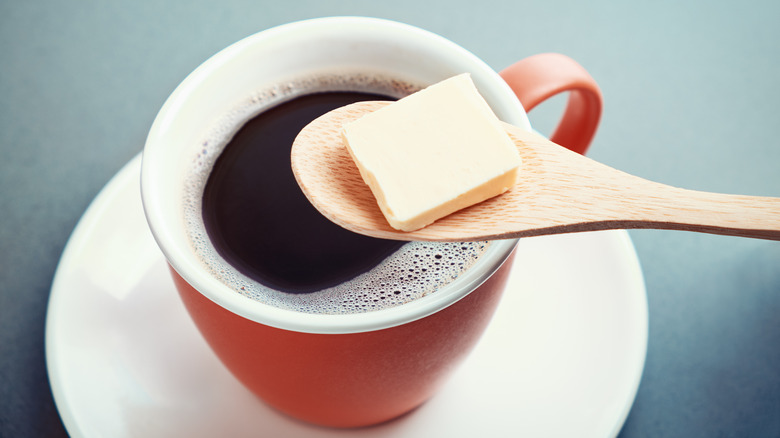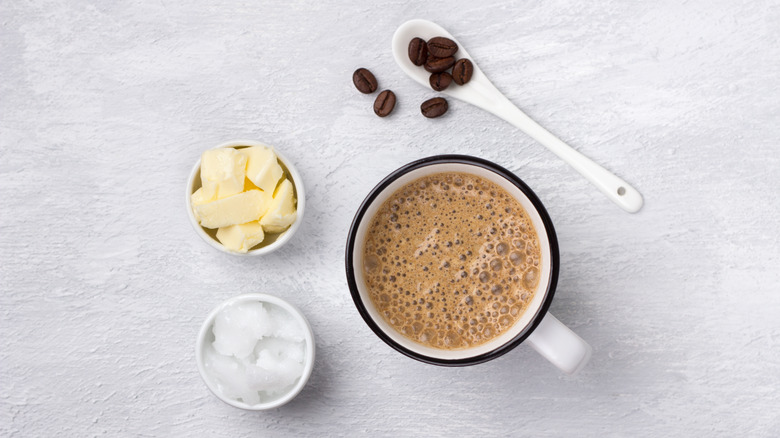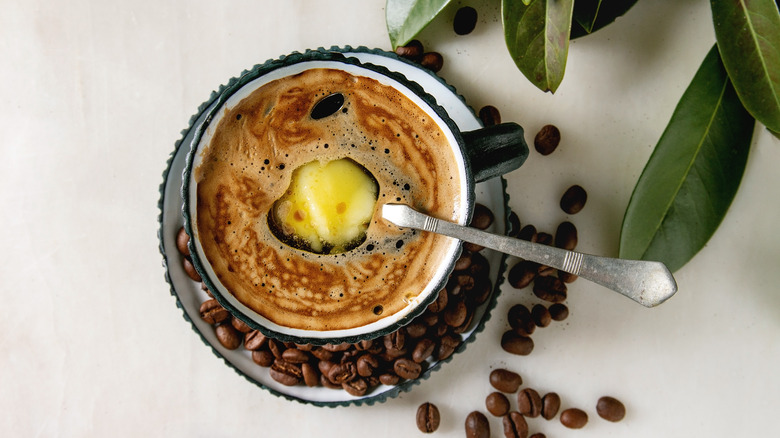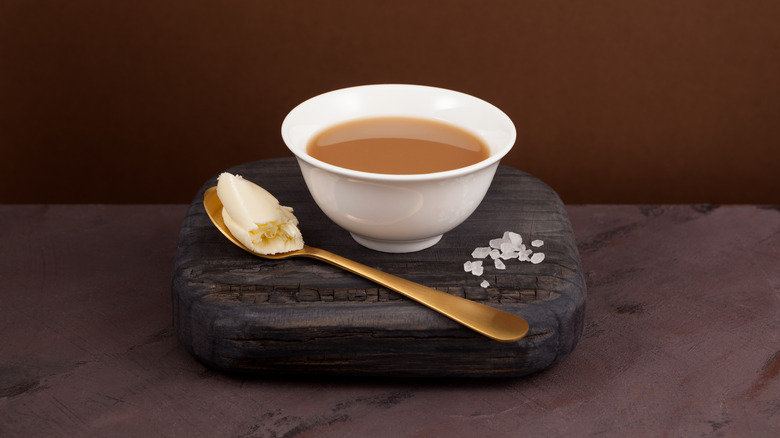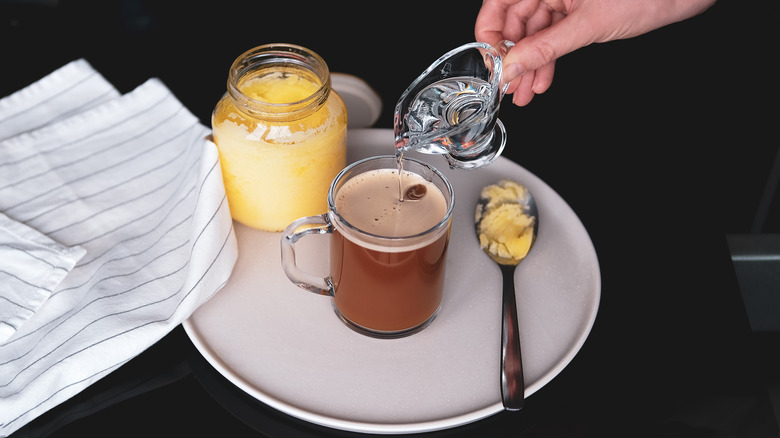What Exactly Is Butter Coffee And What Does It Taste Like?
Adding butter to your morning coffee might sound unusual at first — and the thought of doing so for your health even more so. However, a growing number of people are doing just that. Butter coffee, which is indeed, as its name suggests, coffee with butter melted into it, has become wildly popular amongst followers of the high-fat, low-carb ketogenic diet. Many have claimed it helps them stay full and energized for longer than a typical breakfast. It can also eliminate the jitters and ultimate crashes that usually come with regular caffeine consumption. Plus, we love to put other dairy products in our coffee, so why not butter?
In recent years, butter coffee has become an increasingly common menu at American cafes, particularly those that cater to young, health-conscious customers. The health claims that have been made about it are a point of controversy, as there is little in the way of scientific research to back them up. Similar beverages have played an essential role in the folk medicine of multiple cultures worldwide. Plus, not everybody who drinks butter coffee does so for the purpose of keto or some other health regimen; some people enjoy it simply for its distinct taste and texture. Easy enough for anyone to make at home, this morning brew could be just the weekday breakfast you need.
What is butter coffee?
Making butter coffee is a little more complex than just adding butter to coffee, although you can do that if you'd like. The problem is that butter is mostly fat, and coffee is mostly water, and we all know that oil and water don't mix. If you just plop a pat of butter in your coffee and wait for it to melt, you'll get a very greasy beverage that will leave a slick sheen on your lips and tongue. The best way to get the coffee and butter to thoroughly emulsify is by using a blender and blending them until everything is smooth and caramel-colored.
Butter coffee is usually made with a couple of additional ingredients, the main one being MCT oil. MCT stands for medium-chain triglyceride, a type of fat that has smaller molecules than most other fats, making it easier for our bodies to digest. You can use coconut oil in place of MCT oil, though, as coconuts have a high MCT content. Most people add an equal amount of butter and oil, usually one to two tablespoons per cup of coffee.
Butter coffee is made with plain black coffee, but many people add a sweetener, either sugar or a zero-calorie sweetener, for those who drink it as part of the keto diet. You can also add vanilla extract, and if you use coconut oil instead of MCT, you'll get a little hit of coconut as well.
What does butter coffee taste like?
Butter coffee is polarizing, and you really can't tell how you'll feel about it until you try it. Fans of the drink liken it to coffee with cream, but the flavor really depends on how you make it. If it is properly blended, this creamy concoction will become quite frothy, and it ends up tasting like a latte. However, if you don't fully emulsify the butter, coffee, and MCT/coconut oil, you will get an uneven flavor and texture, with oily streaks floating in black coffee.
Timing is of the utmost importance when it comes to butter coffee. You need to drink it up quickly, right after blending it, otherwise, the emulsification will break. As the coffee sits, the butterfat and MCT oil will separate, and just like that, the greasy streaks are back.
As previously mentioned, most recipes call for a tablespoon or two of both butter and MCT oil in a single cup of black coffee, but that guideline is by no means set in stone. If you taste it and find that it's too rich, you can try again, either adding less butter or making a larger cup of coffee. You can also adjust the amounts of coconut oil, sweetener, and flavor extracts you may be adding.
The history of butter coffee
Butter coffee has been around since long before anyone thought to say the words "keto diet," but its history does tie into the purported benefits that led to its modern surge in popularity. One of the drinks that inspired the contemporary butter coffee trend is po cha, widely considered to be the national beverage of Tibet. Po cha is made with black tea rather than coffee, the two most popular tea choices being Pu'erh and Pemagul, both known for their smoky flavor. But the true defining feature of po cha is the inclusion of butter made from yak's milk. Originally, Tibetans churned butter and tea to emulsify them, but today, most use a blender.
Similar beverages also hold cultural significance in several Southeast Asian countries. In Singapore, many people drink nanyang kopi, a highly caffeinated form of coffee, which can be mixed with butter and condensed milk to make a drink called kopi gu you. In Vietnam, there is cà phê trúng, which is coffee made with butter and egg.
Butter coffee entered a new era in the 2010s, becoming popular as a health supplement. This modern movement may owe its origins to Dave Asprey, an early innovator in the field of cloud computing and self-described "Father of Biohacking." Asprey was introduced to po cha on a trip to Tibet in 2004 and developed an obsession with it. Inspired, he returned to the United States and founded Bulletproof Coffee.
Butter coffee vs. Bulletproof Coffee
The terms "butter coffee" and "Bulletproof Coffee" have become interchangeable in the decade since Asprey founded his company. It's kind of a Kleenex tissue situation where one brand dominates its field to such an extreme degree that it becomes synonymous with the product itself. Bulletproof Coffee is just that — a specific brand of butter coffee.
Bulletproof Coffee is sold as a three-piece kit featuring low-acid coffee beans, MCT oil, and grass-fed ghee in place of regular butter. Asprey and his Bulletproof brand deserve credit for popularizing the use of MCT oil in butter coffee, making it a key part of their product. Asprey has published his Bulletproof Coffee recipe online, which makes it easily adaptable for home use. It's fine to substitute butter for the ghee, but be sure to use unsalted butter, preferably grass-fed. Grass-fed butter tends to contain lower levels of saturated fats and more healthy fats like omega-3 fatty acids and CLA.
Health effects of butter coffee
Bulletproof Coffee has been marketed to improve physical and cognitive functions, but is it really all it's hyped up to be? It's based on the fact that fat can slow the body's absorption of caffeine, which should theoretically keep you steadily energized for longer rather than experiencing a caffeine surge and crash. However, Healthline points out that butterfat only does this to a small degree. MCT oil is mainly responsible for this effect, which is why putting just butter in your coffee probably won't change your energy levels.
It's also been claimed that butter coffee can improve cognitive function, specifically when made with MCT oil, which our bodies convert into ketones, an important reserve energy source. Ketones have been shown to benefit certain neurodegenerative conditions such as Alzheimer's (per the National Library of Medicine). However, Healthline argues against the idea that ketones improve overall focus, citing a lack of evidence. The heightened alertness some daily drinkers report likely comes from the coffee's caffeine level.
Butter coffee is supposed to help you keep weight off by keeping you full for longer, but there are some concerns that it could do the opposite, thanks to butter's calorie-dense nature. In fact, it is so caloric that many people skip breakfast and just drink butter coffee, which is problematic. The Cleveland Clinic warns against drinking butter coffee daily because it offers far fewer nutrients than a complete breakfast.
